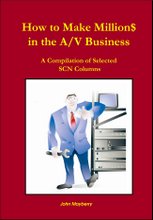
You won't believe this one... read on...
By SARAH MCBRIDE
September 17, 2007
For several years, MediaDefender has made a name for itself waging war against intellectual-property pirates on behalf of the movie and music industries. Now, hackers have gone after MediaDefender itself, posting what they say are employee emails on the Internet purporting to expose embarrassing secrets about the entertainment industry's efforts to battle piracy.
-
Santa Monica, Calif.-based MediaDefender, a unit of ArtistDirect Inc., hires itself out to clients such as movie studios and record labels to help impede file-sharing piracy of their content.
Santa Monica, Calif.-based MediaDefender, a unit of ArtistDirect Inc., hires itself out to clients such as movie studios and record labels to help impede file-sharing piracy of their content.
-
Among the services it offers are "decoying" and "spoofing" -- flooding the Internet with fake files that mimic real content to make it difficult for pirates to find the real thing. It also offers "leak alerts" that tell the studios and labels which of their products are circulating among Internet pirates.
-
-
But over the weekend, information about MediaDefender's efforts was splashed across the Internet via a leak of purported employee emails. Among the alleged revelations: the company was developing a Web site, MiiVii, that would allow people to upload and download copyright movies, TV shows and music. But when people installed it, the software could also secretly track people's activity and report back to MediaDefender.
-
Randy Saaf, chief executive at MediaDefender, said the company had been testing the MiiVii Web site, but denied that it aimed to entrap users or was "a devious product like promoted in the blogosphere." He declined to elaborate, saying it was part of the company's "trade secrets."
-
-
A MediaDefender employee said the company is investigating how the emails were leaked.
A group called "Media Defender-Defenders" took responsibility for posting the emails onto the Internet, stating: "By releasing these emails we hope to secure the privacy and personal integrity of all peer-to-peer users." The leaked emails consumed technology bloggers over the weekend, who took portions of the emails from the less-accessible parts of the Internet and posted them to sites such as torrentfreak.com.
-
According to at least one email, MediaDefender also appeared to be considering software to co-opt MiiVii users' computers and turn them into antipiracy machines that would send out bogus files across the Internet to hinder other users' attempts to download copyright content. Such files appear to be valid copies of the pirated song or movie, but in fact would come up empty or tie up downloaders' computers for hours. Mr. Saaf denied the company has such plans.
-
-
Included in the emails were some personal data including employee home phone numbers and social security numbers, along with private emails with clients. In one case, a Universal Music executive asked if there was any data showing the music industry's lawsuits were reducing file-sharing activity from addresses ending in .edu -- namely, colleges and universities. An email showed that Mr. Saaf forwarded the message to five employees with the note: "Take a moment to laugh to yourselves." A spokesman for Universal had no comment.
-Some clients expressed frustration in emails that despite hiring MediaDefender, their property was widely available on the Web. One Sony BMG executive complained that he was able to download Beyonce's "Beautiful Liar" on the Soulseek site, despite MediaDefender's work to protect the song. "Can you please investigate the problem and ACTUALLY solve it (going on for months now)?" the executive writes. Sony BMG had no comment.
-In addition to the emails, it appears hackers also may have been able to monitor some of MediaDefender's phone calls. One phone call circulating as an audio file on the Internet purports to be a discussion between the office of the New York State attorney general and MediaDefender, which appeared to be working with it on a child-pornography crackdown.
-During the call, the issue of security comes up, and a MediaDefender employee assures the attorney general's staff that communications are secure. Just before that, the call cuts in and out and the employee asks if they are on a mobile phone; a staffer explains they are actually calling using an Internet phone line.
-Mr. Saaf declined to comment on the authenticity of the phone call. The attorney general's office declined to comment.
-The very fact that MediaDefender suffered a leak could be a setback. "You've got a company whose mission is to prevent access to copyrighted content on the Internet," says Eric Garland, chief executive officer of BigChampagne LLC, a company that tracks pirated online content.
-"And now that company's most sensitive information is freely available on the Internet. If you can't prevent access to [that]...how are you going to prevent access to Harry Potter?"
-Some bloggers speculated the Motion Picture Association of America was behind MiiVii, but Mr. Saaf denied it. The association declined to comment.
-Write to Sarah McBride at sarah.mcbride@wsj.com


